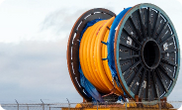What is a THOF Cable?
THOF (Thermoplastic High-Temperature Oil-Resistant Flexible) cable is a specialized wire designed for industrial applications requiring flexibility, high-temperature resistance, and resistance to oil and other substances. The cable is most commonly used in ship-to-shore power. It typically features a thermoplastic EPR insulation and neoprene jacket that provide these properties. It also has a tinned copper conductor that works in corrosive environments. The cable is often used in circumstances where high heat and exposure to oil or chemicals are expected, such as motors, transformers, and machinery in manufacturing settings. THOF cables under the M915E/6 standard are suited for military naval applications.
Key characteristics of THOF cables include:
- Temperature rating: Usually rated for continuous operation at temperatures up to 105°C.
- Oil resistance: Designed to withstand exposure to oil, lubricants, and other chemicals, ensuring long-term durability in harsh environments. It is also perfect for use in salt water.
- Flexibility: Typically built with a stranded conductor to enhance flexibility, allowing easy installation in tight or complex routing scenarios.
- Voltage rating: Often used in low to medium voltage applications, commonly up to 600V.
THOF cables are a good choice for applications requiring robust performance in tough industrial conditions.

THOF Cables in Marine Environments
THOF cable is most commonly used as a ship-to-shore cable.
This includes:
- Shipboard power distribution: This includes things like engine rooms, control panels, lighting systems, and auxiliary machinery.
- Marine motors and machinery
- Offshore drilling platforms
- Port and harbour infrastructure
- Submersible pumps and underwater applications
THOF Cables vs. Other Cables
THOF cables (Thermoplastic High-Temperature Oil-Resistant Flexible) offer specialized features that set them apart. Below is a comparison of THOF cables with some commonly used cable types in similar industrial and marine environments:
THOF vs. SOOW Cables
- Construction:
- THOF: Typically features EPDM insulation with a chloroprene jacket, designed for higher temperatures, chemical resistance, and flexibility.
- SOOW: Made with thermoset insulation and a thermoset jacket, offering resistance to oil, water, and abrasion.
- Voltage rating:
- THOF: Rated for 600V or 2000V, making it suitable for medium-voltage applications.
- SOOW: Typically rated for up to 600V.
- Flexibility and use:
- THOF: More flexible and suited for applications requiring continuous reeling, such as cranes, hoists, and heavy-duty machinery.
- SOOW: Often used in portable tools, motors, and temporary power installations.
- Applications: Both are oil-resistant and flexible, but THOF is preferred for more demanding environments requiring higher temperature tolerance and enhanced mechanical durability.
THOF vs RHW-2 Cables
- Construction:
- THOF: EPDM rubber insulation with chloroprene for superior environmental and mechanical resistance.
- RHW-2: Cross-linked polyethylene (XLPE) insulation with high resistance to moisture and chemicals.
- Temperature ratings:
- THOF: Rated for up to +90°C continuous operation.
- RHW-2: Typically rated for up to +90°C in wet or dry conditions.
- Applications:
- THOF: Ideal for harsh, flexible installations in industrial and marine environments.
- RHW-2: Commonly used in building wiring and underground installations, where moisture and chemical resistance are key.
- Overlap: Both cables offer resistance to heat and chemicals, but THOF’s additional flexibility and durability make it better for applications involving continuous movement.
THOF vs Type G and G-GC Cables
- Construction:
- THOF: Flexible tin-coated copper conductors with EPDM and chloroprene layers.
- Type G/G-GC: Made with rubber insulation and jackets, focusing on rugged environments.
- Voltage rating:
- THOF: Rated up to 2000V.
- Type G/G-GC: Usually rated for 600V, but G-GC can handle up to 2000V.
- Flexibility and use:
- THOF: High flexibility with reinforcement layers for heavy-duty mobile applications.
- Type G/G-GC: Also flexible and durable, primarily used in mining and industrial power distribution.
- Applications: While both are heavy-duty cables, THOF is better suited for marine and offshore applications, and G-GC is better for mining and heavy industrial machinery. THOF is a more flexible cable, while G-GC is more rugged.
THOF cables are available at NNC at excellent prices.


















